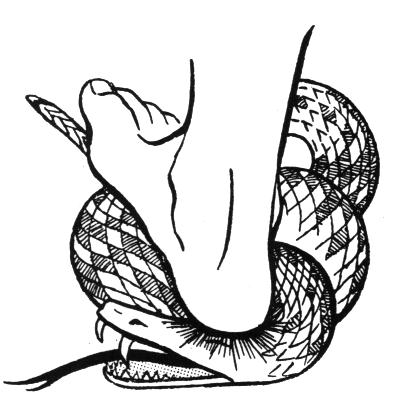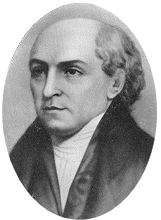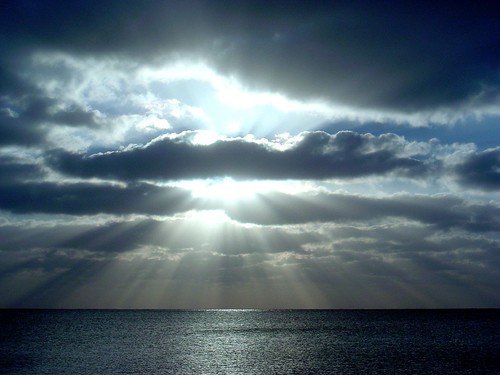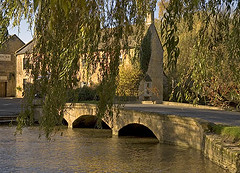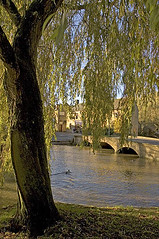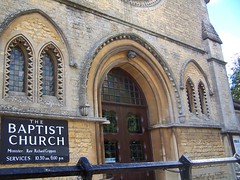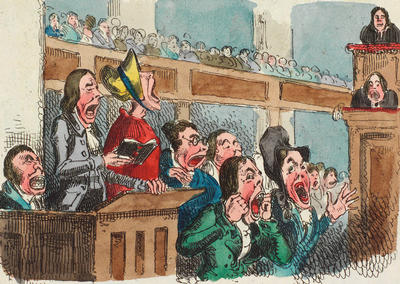Later trials and tribulations
At this point we record some of the other trials and troubles Beddome faced, especially in the last 30 years of his life, and the grace of God that he knew. Beddome himself observed that
Unnumbered trials, doubts and fears
Attend us in this vale of tears;
But through the grace of God our friend
They shall in lasting triumphs end.
(Hymn 550, verse 1 of 3, under the heading Trials over-ruled for Good)
1765 was, in many ways, an encouraging year. It was in this year that the new enlarged chapel was erected and the Association (delayed for their sakes to August) met in Bourton, Beddome’s association letter receiving publication. By the January of 1766 Nathanael Rawlings (d 1809), a member at Bourton, was settled as pastor at the Back Street Chapel, Trowbridge.
However, tainting such joys was the death on February 4, 1765, of the Beddomes’ first son, John. He was only 15 (or was he 19, dying four years later?). Despite his youthfulness he apparently died well, giving evidence of a genuine faith in Christ. This must have been a comfort to Benjamin and Elizabeth as they committed themselves to God.
In 1777, Beddome turned 60. He was suffering increasingly from the painful arthritic condition of gout, which sometimes prevented him from carrying out his duties. It was decided that he should have an assistant. A number of men were considered but in the end on August 3 a William Wilkins (c 1752 - c 1812) from nearby Cirencester came. They shared the stipend from that point. He had trained for the ministry in Bristol and in Scotland. He remained for at least the next 15 years. This move was designed to ease Beddome’s burdens but, as we will see below, served in many ways to increase them.
Wilkins appears to have been, like Beddome, a son of the manse and yet another originally preparing for a medical career. Cf Rippon, 318. Wilkins came to have close ties with the Beddome family as, according to Samuel Beddome’s ms notebook, two of his sisters married Beddome sons. In 1786 Boswell Brandon married Anne Wilkins. Another brother, Samuel, had married Jane Wilkins. He appears to have set up a drapers’ business with Hewitt Fysh (c1767-1811) in Camberwell. Fysh was first married (1793) to yet another (rather older) sister, Mary Wilkins (c1756-1804).
Benjamin Junior had moved to Edinburgh to pursue the study of medicine. He was a gifted linguist and an all round scholar and had been accepted into the Edinburgh medical society at a young age. Later that year came the news that he had gained a doctorate from the University at Leyden in Holland for a thesis on the variety of human species and their causes, that went into at least a second edition. (
Tentamen Philosophico-Medicum Inaugurale de Hominem Varietatibus et carum Causis. The Angus Library has a copy of the second edition). What an excellent future seemed to lay before him. But it was not to be.
At the turn of the year Benjamin junior took ill with ‘a putrid fever’ (typhus) and on January 4, 1778, he quite suddenly died. He was only 25. This happened in Edinburgh and so news of the untimely death did not reach the family immediately. However, it so happened that the day before the death Beddome preached aptly on Psalm 31:15
My times are in thy hand. The congregation had also sung his hymn (22 in the book and headed Resignation) beginning
My times of sorrow and of joy,
Great God, are in thy hand;
My chief enjoyments come from thee,
And go at thy command
It includes the appropriate closing fifth verse
Here perfect bliss can ne’er be found,
The honey’s mixed with gall;
Midst changing scenes and dying friends,
Be thou my all in all.
It was his practice to begin next Sunday’s preparation on the previous Sunday evening and he had also already made plans to preach the following Sunday on ‘full of eyes’ from Ezekiel 10:12. It is salutary to note his comment,
'But alas! How much easier is it to preach than practice! I will complain to God but not of God. This is undoubtedly the most affecting loss I have ever yet sustained in my family. Father of mercies, let me see the smiles of thy face, whilst I feel the smart of thy rod. Job 14:13. Thou destroyest the hope of man. (
Memorial, xxiv).
In 1780 Wilkins married a Miss Alice North, a Presbyterian from Overthorpe, near Banbury, Oxfordshire. (According to one of the Bourton Church books she died May 8, 1798. Samuel Beddome’s ms notebook says Wilkins later married a Latitia Field from Hackney. We know that Wilkins was 59 when he died in 1812 having been ordained to the pastorate in Cirencester in 1795 and later pastoring at Naunton and Stow. Cf Holmes, 82). This seems to have been the catalyst for an easing of the previously strict requirements regarding qualifications for communion. There is evidence that Wilkins took an open view of communion rather than the strict view held in the church until this period. (Cf Holmes, 3, 73, 81; Naylor,
Picking up a pin for the Lord: English Particular Baptists from 1688 to the early 19th Century, GPT, London, 1992, 60). There continued to be some tension over the matter. It was not the only source of unhappiness and on December 13, 1781, Wilkins angrily resigned his post. This led to something of a crisis, which is described over several pages in the church book (Bourton Church Book 1765-1920, 44-47).
The main cause of contention seems to have been Wilkins’ belief that, although very much Beddome’s junior, he should be given equal footing. A certain amount of envy, on Wilkins’ part, appears to have been at play here. It is clear that the sympathies of the congregation were very much with Beddome in this crisis, although they wanted to keep Wilkins on. Beddome clearly sought to be magnanimous but was hurt by Wilkins’ behaviour. Eventually Wilkins was brought to see that an equal financial split was not possible, as certain benefits had been given to Beddome in person. The crisis dragged on into 1782 and flared up again in 1784. Wilkins finally resigned in 1791. A Mr Reed appears to have assisted Beddome, following Wilkins’ departure.
From the beginning of 1783 Beddome was confined to his home by gout. In one week, early in April 1783, his brother-in-law and father-in-law both died. (Cf Samuel Beddome’s ms notebook reference to his uncle Richard Boswell dying, April 12, 1783). Then early in 1784 a fever was prevailing in the village and on January 21, his wife Elizabeth died. She was only 51. Contemporaries spoke of her as being ‘eminent for her unobtrusive piety’. They spoke also of the 'amiableness of her tongue and the sincerity and permanence of her attachment; while her patience under suffering excited the admiration of all.' (
Memorial, xxiv) The church book says ‘No person could be more beloved or their loss more lamented’. (
Bourton Church Book 1765-1920, 57). After some 34 years of happily married life, she must have been sorely missed. Early in 1784 Beddome composed the 4 verse Hymn 324 ‘If loads guilt oppress’, sung according to a ms notebook, January 11. Verse 3: ‘Supported by his arm, I need no other aid; If he but look on my distress, I will not be afraid’. Verse 4: ‘To him myself, my all I cheerfully resign; Thankful, if smooth the path I tread, If rough I’ll not repine.’
To add sorrow to sorrow, on October 20, 1784, his son Foskett drowned at Deptford as he was about to board ship. Like his brother Benjamin, and Beddome himself, he had been trained in the medical line. He was just 26. The other children appear to have lived to a good age.
In Samuel Beddome’s ms notebook, he notes that Richard died, 1795; Samuel, 1815; Boswell Brandon, 1816. Eliza married a Samuel Fawell and Josephus a Sophy Petrie. Their deaths are not recorded but by 1834 Josephus was dead as Thomas Coles mentions his widow, living in Leamington (Bourton Church Book 1719-1802, 20).
Thus in his later years Beddome had to face many trials that drove him back to the God of all grace.
The trial, awfully severe,
Will have a gracious end;
And though no helper now is near
The Lord will be thy friend.
Then will I humbly wait, till he
His kindly aid afford;
To his kind arm for succour flee
And trust his Holy Word.
(Hymn 548, the last two verses of a 3 verser headed The Christian in a Storm and beginning ‘Though lightnings flash and thunders roll, And tempests loudly roar, Take courage, oh my trembling soul, The storm will soon be o’er’).
It was not all trouble by any means. There were many opportunities for fellowship with other ministers at Association meetings and ordinations and although never a great one for preaching away from home he would still visit Bristol, Warwickshire, Abingdon and London to preach and to renew acquaintance with family and friends.
Entrance to the Universities of Oxford and Cambridge was still very much barred to nonconformists at this time but in 1770 Beddome received an honorary Masters degree from the
Senatus Academicus of far away
Providence College, Rhode Island, New England (later Hope, then Brown University). A backwater Bourton may have been but news of its distinguished pastor had travelled far and wide.
There was also the continued support of people like William Snook (b 1730). Although not a church member, he was one of Beddome’s most valued moral and financial supporters. From his first arrival in Bourton he would give Beddome 5 and then 8 guineas a year. He later did something similar for Wilkins. (Cf
Bourton Church Book 1765-1920, 47). He is described, after his death, as having ‘a great regard to Mr Beddome as a friend and minister’. In June 1751, Snook, a gentleman, had married Frances Seward (1732-1766), wealthy daughter of Benjamin and Elizabeth Seward (both died in 1753) of Badsey in Evesham. (Cf Marriages at Badsey 1750-1759 available
here. There seems to have been a double wedding that day as a Grace Seward was also married – to a Josiah Roberts. Grace was the widow of William Seward and an aunt to Frances by marriage). In February 1753, her sister Eleanor Seward (1733-1780) married Richard Hall (1728-1801) who later moved to Bourton. Influenced no doubt by his friendship and family ties with Snook but especially by his regard for Beddome, Hall determined to live in Bourton too. (More on the Sewards in another post).
 Following Beddome’s death there was a split over whether to call Wilkins back or for Reed to become the main pastor. In the end it was agreed that it was better to go for an outsider and in April 1797 a Mr Uppadene began preaching. Wilkins’ name continued to be promoted, however, until in October 1801, they called their own former member, Thomas Coles.
Following Beddome’s death there was a split over whether to call Wilkins back or for Reed to become the main pastor. In the end it was agreed that it was better to go for an outsider and in April 1797 a Mr Uppadene began preaching. Wilkins’ name continued to be promoted, however, until in October 1801, they called their own former member, Thomas Coles. Following Beddome’s death there was a split over whether to call Wilkins back or for Reed to become the main pastor. In the end it was agreed that it was better to go for an outsider and in April 1797 a Mr Uppadene began preaching. Wilkins’ name continued to be promoted, however, until in October 1801, they called their own former member, Thomas Coles.
Following Beddome’s death there was a split over whether to call Wilkins back or for Reed to become the main pastor. In the end it was agreed that it was better to go for an outsider and in April 1797 a Mr Uppadene began preaching. Wilkins’ name continued to be promoted, however, until in October 1801, they called their own former member, Thomas Coles.
